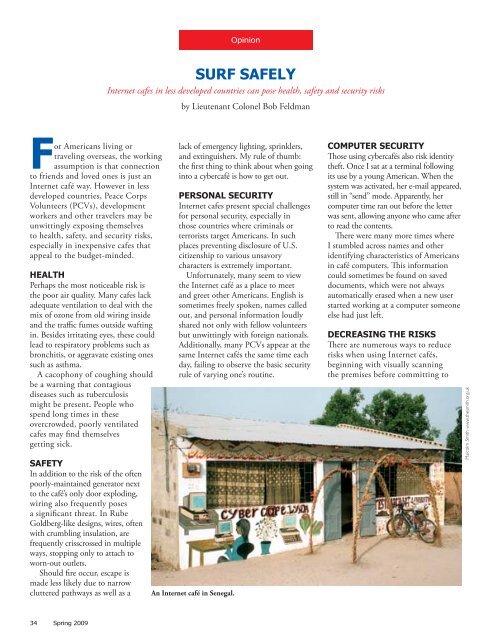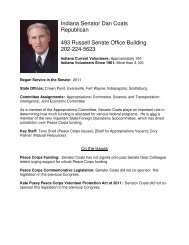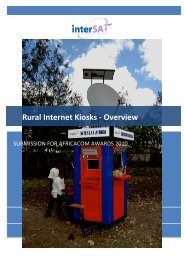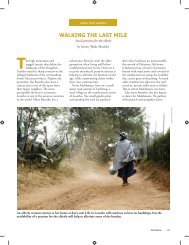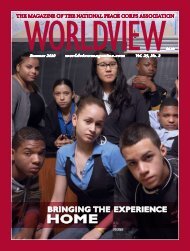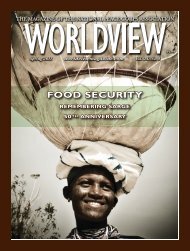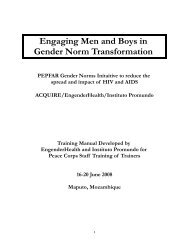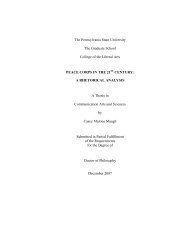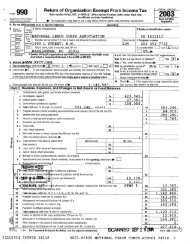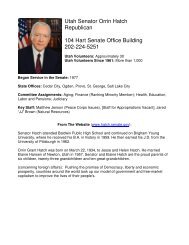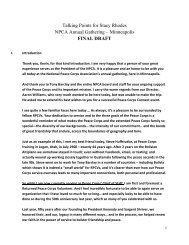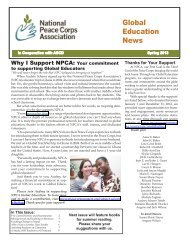special issue: inauguration 2009 - National Peace Corps Association
special issue: inauguration 2009 - National Peace Corps Association
special issue: inauguration 2009 - National Peace Corps Association
Create successful ePaper yourself
Turn your PDF publications into a flip-book with our unique Google optimized e-Paper software.
Opinion<br />
SURF SAFELY<br />
Internet cafes in less developed countries can pose health, safety and security risks<br />
by Lieutenant Colonel Bob Feldman<br />
For Americans living or<br />
traveling overseas, the working<br />
assumption is that connection<br />
to friends and loved ones is just an<br />
Internet café way. However in less<br />
developed countries, <strong>Peace</strong> <strong>Corps</strong><br />
Volunteers (PCVs), development<br />
workers and other travelers may be<br />
unwittingly exposing themselves<br />
to health, safety, and security risks,<br />
e<strong>special</strong>ly in inexpensive cafes that<br />
appeal to the budget-minded.<br />
HEALTH<br />
Perhaps the most noticeable risk is<br />
the poor air quality. Many cafes lack<br />
adequate ventilation to deal with the<br />
mix of ozone from old wiring inside<br />
and the traffic fumes outside wafting<br />
in. Besides irritating eyes, these could<br />
lead to respiratory problems such as<br />
bronchitis, or aggravate existing ones<br />
such as asthma.<br />
A cacophony of coughing should<br />
be a warning that contagious<br />
diseases such as tuberculosis<br />
might be present. People who<br />
spend long times in these<br />
overcrowded, poorly ventilated<br />
cafes may find themselves<br />
getting sick.<br />
SAFETY<br />
In addition to the risk of the often<br />
poorly-maintained generator next<br />
to the café’s only door exploding,<br />
wiring also frequently poses<br />
a significant threat. In Rube<br />
Goldberg-like designs, wires, often<br />
with crumbling insulation, are<br />
frequently crisscrossed in multiple<br />
ways, stopping only to attach to<br />
worn-out outlets.<br />
Should fire occur, escape is<br />
made less likely due to narrow<br />
cluttered pathways as well as a<br />
lack of emergency lighting, sprinklers,<br />
and extinguishers. My rule of thumb:<br />
the first thing to think about when going<br />
into a cybercafé is how to get out.<br />
PERSONAL SECURITY<br />
Internet cafes present <strong>special</strong> challenges<br />
for personal security, e<strong>special</strong>ly in<br />
those countries where criminals or<br />
terrorists target Americans. In such<br />
places preventing disclosure of U.S.<br />
citizenship to various unsavory<br />
characters is extremely important.<br />
Unfortunately, many seem to view<br />
the Internet café as a place to meet<br />
and greet other Americans. English is<br />
sometimes freely spoken, names called<br />
out, and personal information loudly<br />
shared not only with fellow volunteers<br />
but unwittingly with foreign nationals.<br />
Additionally, many PCVs appear at the<br />
same Internet cafés the same time each<br />
day, failing to observe the basic security<br />
rule of varying one’s routine.<br />
An Internet café in Senegal.<br />
COMPUTER SECURITY<br />
Those using cybercafés also risk identity<br />
theft. Once I sat at a terminal following<br />
its use by a young American. When the<br />
system was activated, her e-mail appeared,<br />
still in “send” mode. Apparently, her<br />
computer time ran out before the letter<br />
was sent, allowing anyone who came after<br />
to read the contents.<br />
There were many more times where<br />
I stumbled across names and other<br />
identifying characteristics of Americans<br />
in café computers. This information<br />
could sometimes be found on saved<br />
documents, which were not always<br />
automatically erased when a new user<br />
started working at a computer someone<br />
else had just left.<br />
Decreasing the Risks<br />
There are numerous ways to reduce<br />
risks when using Internet cafés,<br />
beginning with visually scanning<br />
the premises before committing to<br />
Malcolm Smith www.thesmith.org.uk<br />
34 Spring <strong>2009</strong>


